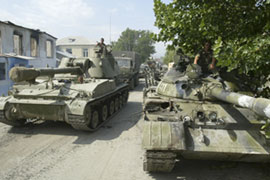Georgia claims fighting continues
Tbilisi reports continued Russian bombing despite Medvedev’s ceasefire announcement.

Further north in the separatist capital of Tskhinvali, houses were still burning following the battles of the last week and Russian tanks and armoured personnel carriers patrolled the deserted streets.
‘Lunatic’ leader
Medvedev criticised Mikheil Saakashvili, describing the Georgian president as a “lunatic”.
“You know, lunatics’ difference from other people is that when they smell blood it is very difficult to stop them. So you have to use surgery,” Medvedev told a news conference.
| Map |
|
|
Many Georgians dismissed Russian calls on Tuesday for Saakashvili to step down with at least 150,000 Georgians cheering their president at a rally to support the war with Russia over South Osseita.
Speakers shook with anger and denounced Russia’s aggression while the crowd waved Georgian flags and posters depicting Vladimir Putin, the Russian prime minister, as a “terrorist”.
One placard showed Putin in a mug shot – “Wanted: crimes against humanity and the world,” the caption read.
Flanked by bodyguards, Saakashvili arrived about an hour after the start of the rally to claps and cheers.
“I promise you today, that I’ll remind them of everything they have done and one day we will win,” Saakashvili said.
The crowd roared: “Georgia, Georgia!”.
Ceasefire announced
Russia’s announcement of a ceasefire pre-empted the arrival in Moscow of Nicolas Sarkozy, the French president, who travelled to the Russian capital to propose an EU ceasefire plan.
 |
| Russia’s ceasefire announcement pre-empted Sarkozy’s arrival [AFP] |
Sarkozy and Dimitry Medvedev, his Russian counterpart, agreed conditions for ending the fighting in Georgia, endorsing a plan that called for both Russian and Georgian troops to end hostilities, move back to their initial positions and allow unhindered access for humanitarian assistance.
“The Russians – and president Medvedev confirmed this to me – have no intention of remaining in Georgia,” Sarkozy said after the meeting.
“We don’t yet have peace. But we have a provisional cessation of hostilities. And everyone should be aware that this is considerable progress. There is still much work to be done … What we want is to secure the best result.”
He also said the EU was prepared to deploy peacekeepers in Georgia if all parties agreed.
“Could Europe participate in a European peacekeeping force? … Obviously we are entirely ready to consider this kind of participation, if the various actors desire it,” he said.
Al Jazeera’s Neave Barker, reporting from Moscow, said it was unclear what Russia meant by a “halt in operations”.
“They say they have achieved their strategic goals, to keep the peace, to restore order … but it is unclear how that fits in to the EU four-point plan of withdrawing troops to pre-operation levels,” he said.
‘Peacekeeping duties’
Medvedev said Russian peacekeepers would remain in both South Ossetia and Abkhazia, Georgia’s other breakaway region, to ensure stability in the Caucasus region.
“Our peacekeepers are continuing to perform their duties and will continue to perform their duties because they are a key factor for upholding security in the Caucasus,” Medvedev said, standing alongside Sarkozy.
“That has been the case and that will continue to be the case.”
In a separate development, Georgia announced it had withdrawn from the strategic Kodori Gorge in Abkhazia, the only part of the breakaway region under Georigian control.
“We have left Kodori. There was an evacuation. There were no casualties,” Shota Utiashvili, Georgia’s interior ministry spokesman, said, but gave no details.
Nato support
In Brussels, Jaap de Hoop Scheffer, Nato’s secretary general, said Medvedev’s announcement to stop Russia’s military advance into Georgia “is important but it is not enough”, and urged both sides to withdraw to pre-conflict positions.
 |
| Russian commanders said “provocation” could still be met militarily [Reuters] |
He called for an immediate end to hostilities and said all sides should go back to the positions they held on August 6, before the start of hostilities.
He underlined that as far as Nato was concerned, this meant respecting Georgia’s territorial integrity, including both its Moscow-backed breakaway regions: South Ossetia and Abkhazia.
Georgia has asked for Nato military assistance, including the replacement of a radar system destroyed in the fighting, Revaz Beshidze, the Georgian ambassador to Nato, said.
Later Georgia announced it had filed a law suit against Russia at the International Court of Justice (ICJ), which rules on disputes between nations, accusing Moscow of carrying out “ethnic cleansing”.
‘Ethnic cleansing’
“Today, Georgian ambassador to the Netherlands filed a law suit to the International Court of Justice … because of ethnic cleansing conducted in Georgia by Russia in 1993 to 2008,” Kakha Lomaia, the secretary of Georgia’s Security Council, said.
Russia has before also accused Georgia of “genocide” in South Ossetia and Luis Moreno-Ocampo, the International Criminal Court chief prosecutor, said he had been contacted about the conflict in Georgia’s breakaway province of South Ossetia.
Asked if he would be launching a preliminary investigation, he said: “It is a possibility”, but gave no further details.
Russia claims 2,000 civilians have been killed in fighting in South Ossetia, a figure disputed by Georgia.
The conflict over the tiny separatist province of South Ossetia began when Georgia tried to retake the pro-Russian region last week, provoking a massive counter-offensive from Moscow.
